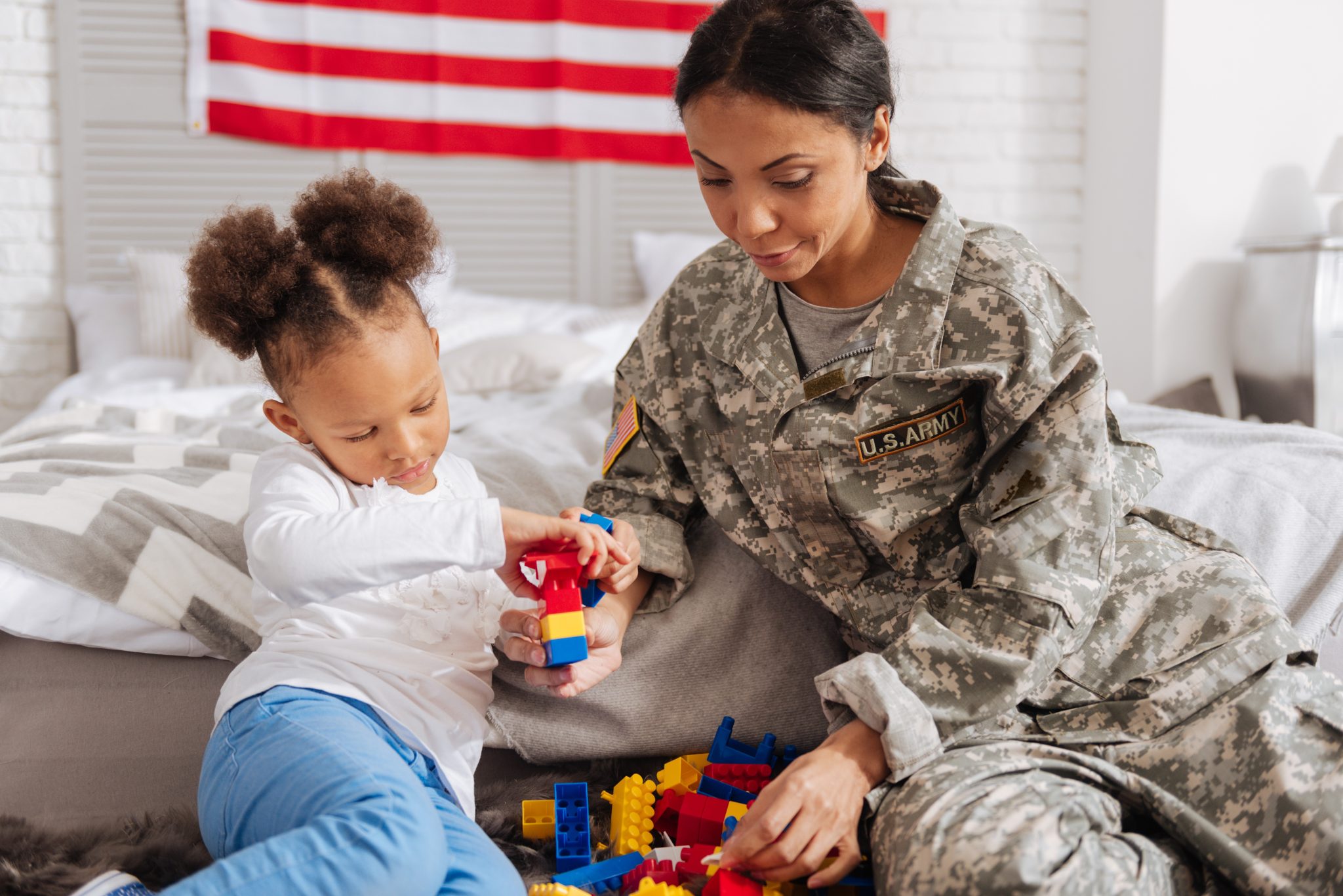By Karen Shirer, Ph.D.
Several years ago, I helped create a program for new parents to build their family strengths. One activity asked parents to recall positive family experiences from their own childhood. Many parents faced challenges and risks as children, but most identified at least one occasion they fondly remembered. Parents then created a card deck of fun, low- or no-cost experiences to do with their children (e.g., attend story hour at the local library). After the program, parents reflected that they learned there are steps they could take to support their children.
This blog post will explore the idea of helping parents provide positive experiences for their children. We’ll look at the impact of adverse childhood experiences (ACEs) and positive childhood experiences (PCEs) and identify ways to promote PCEs for military families in transition.
The Difference between ACEs and PCEs and Why it Matters
ACEs help family service providers understand the things that negatively impact a child’s well-being. They can also provide a guide for prevention and intervention efforts with families, such as programming or educational workshops.
ACEs stem from traumatic experiences, like child neglect and abuse or an unstable home environment. Studies have linked ACEs to chronic illness, mental health concerns, and risky behaviors in adulthood. The more ACEs a child encounters, the more likely they will struggle in adulthood (Fast Facts: Preventing Adverse Childhood Experiences).
Research has looked at positive childhood experiences (PCEs), also called “counter-ACES.” PCEs were found to make a difference in children’s health and well-being into adulthood. They organized these factors into a framework to guide professionals working with families.
HOPE (Health Outcomes from Positive Experiences) describes PCEs that counter the risk of ACES (Sege & Harper-Browne, 2017). PCEs describe positive activities and experiences for children based on social determinants of health. Some examples include:
- Being in a nurturing, supportive home environment. For example, parents give children secure attachments and warm, stable relationships with caring adults.
- Living, learning, and playing in safe, stable, and equitable spaces. For example, parents give children a safe home situation, and adequate nutrition and sleep.
- Having access to positive youth development experiences. For example, parents offer children opportunities to experience success and accomplishment, a sense of belonging, and one’s cultural identity.
- Learning social and emotional skills. Children can develop cognitive abilities needed to control thoughts, emotions, and actions, positive character traits, and positive responses to challenges.
Since the research paper’s publication in 2017, it has been found that PCEs’ have the potential to weaken ACEs’ effects on children’s development and well-being. Crandell et al. (2019) found that PCEs helped lessen the negative impact on children with four or more ACEs. PCEs nearly negated ACEs’ effects on those children who had fewer than four ACES.
Positive childhood experiences: How to support military families in transition
Transitions, such as parental deployments and frequent permanent change of duty station (PCS) moves may cause stress for children in military families. PCEs may help lessen any negative effects military children and their families are experiencing.
Here are some practical ways, adapted from the HOPE Framework, that service providers can use to support military families:
- Offer parents resources that encourage active engagement with their children and adolescents.
- Encourage parents to read to their younger children.
- For adolescents, provide parents with information on positive youth development activities.
- Consider how you might use the activity at the beginning of this blog post (create a card deck of fun) with military parents.
- Connect military families with support for their basic needs, like Military OneSource. Families need affordable housing, job opportunities, and child care. Check-in with them to see if they have access to affordable and nutritious food. Attend to their mental health needs, and make referrals for care, if needed.
- Encourage parents to connect with other military families in their community. Good places to make these connections are at parks where children play or at events hosted on the installation or in the community. These connections become even more critical for well-being during transitions.
Going further
- Thank military-connected families for their service and ask how they are doing.
- Check out the resources and references in this blog post.
- Plan to participate in these upcoming webinars:
Promoting Youth Mental Well-Being by Building Social Emotional Learning Skills – Wednesday, July 26th: 11:00 am-12:30 pm EDT
What Can Families (and Other Adults) Do to Maximize Youth Well-Being – Thursday, August 10th: 11:00 am-12:30 pm EDT
- Check out these on-demand webinars:
Applying a Positive Youth Development Framework to Increase Resiliency and Thrive – Wed May 31st: 11:00 am-12:30 pm EDT
Supporting Nutrition Security for Military Families through a Multilayered Approach – Wed May 24th: 11:00 am-12:30 pm EDT
References
Alstrin, A. (2023, February 11). Three strategies to better meet military families’ needs – OneOp [Blog post]. OneOp. https://oneop.org/2023/02/11/three-strategies-to-better-meet-military-families-needs/
Centers for Disease Control and Prevention. (2022, April 6). Fast Facts: Preventing Adverse Childhood Experiences. https://www.cdc.gov/violenceprevention/aces/fastfact.html
Crandall, A., Miller, J. R., Cheung, A., Novilla, L. K., Glade, R., Novilla, B., et al. (2019). ACEs and counter-ACES: How positive and negative childhood experiences influence adult health. Child Abuse & Neglect. https://doi.org/10.1016/j.chiabu.2019.104089
Michigan State University Extension. (n.d.). Together We Can: News, programming and other resources from MSU Extension. https://www.canr.msu.edu/together_we_can/
Sege, R. D. & Harper Browne, C. (2017). Responding to ACEs with HOPE: Health outcomes from positive experience. Academic Pediatrics, 17(7S), https://www.academicpedsjnl.net/article/S1876-2859(17)30107-9/fulltext
Writers Biography
 Karen Shirer, previous Associate Dean of the University of Minnesota Extension Center for Family Development. Karen is also the parent of two adult daughters, a grandmother, a spouse, and a cancer survivor.
Karen Shirer, previous Associate Dean of the University of Minnesota Extension Center for Family Development. Karen is also the parent of two adult daughters, a grandmother, a spouse, and a cancer survivor.
Photo Source: Adobestock















